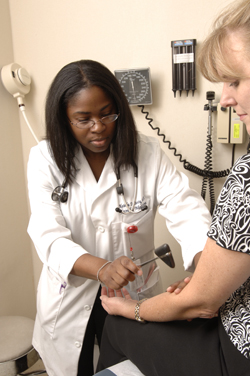
The Florida State University College of Medicine is ranked fourth in the nation for the percentage of its graduating doctors who choose to specialize in family medicine, according to the American Academy of Family Physicians.
Over a three-year period, 17.9 percent of FSU College of Medicine graduates entered family medicine residencies. No other medical school in Florida ranked among the top 60. The University of Kansas was ranked No. 1, with 21.2 percent of its graduates entering family medicine residencies.
The AAFP tracks the success of U.S. allopathic and osteopathic medical schools in producing doctors who select family medicine residencies, and the journal Family Medicine publishes the results annually.
Between 1997 and 2005, the number of medical school graduates entering primary care fields, such as family medicine, decreased by more than half as more graduates chose specialties with higher pay and more control over work hours. The AAFP tracks the success of medical schools in producing family medicine residents, in part, to highlight the need for more family physicians and to shed light on a problem confronting the American health care system.
The FSU College of Medicine, which graduated its first class in 2005, joined the University of Kansas as the only medical schools in the nation to remain in the top four of the survey each of the past two years. Part of the college’s mission is to answer the call for more primary care physicians in Florida, where there is an increasing shortage especially in rural areas. Florida will need an additional 12,000 primary care physicians by 2020 because of population growth and changes in the state’s physician workforce, according to an AAFP study.
"As a medical school, we can’t necessarily control what our students choose for a specialty, but through our admissions process and educational program we try to identify and influence students likely to care for the medically underserved populations that are so much a part of our mission," said Dr. Daniel Van Durme, professor and chair of the department of family medicine and rural health at the FSU College of Medicine. "This is an important confirmation that our efforts are producing successful results."




